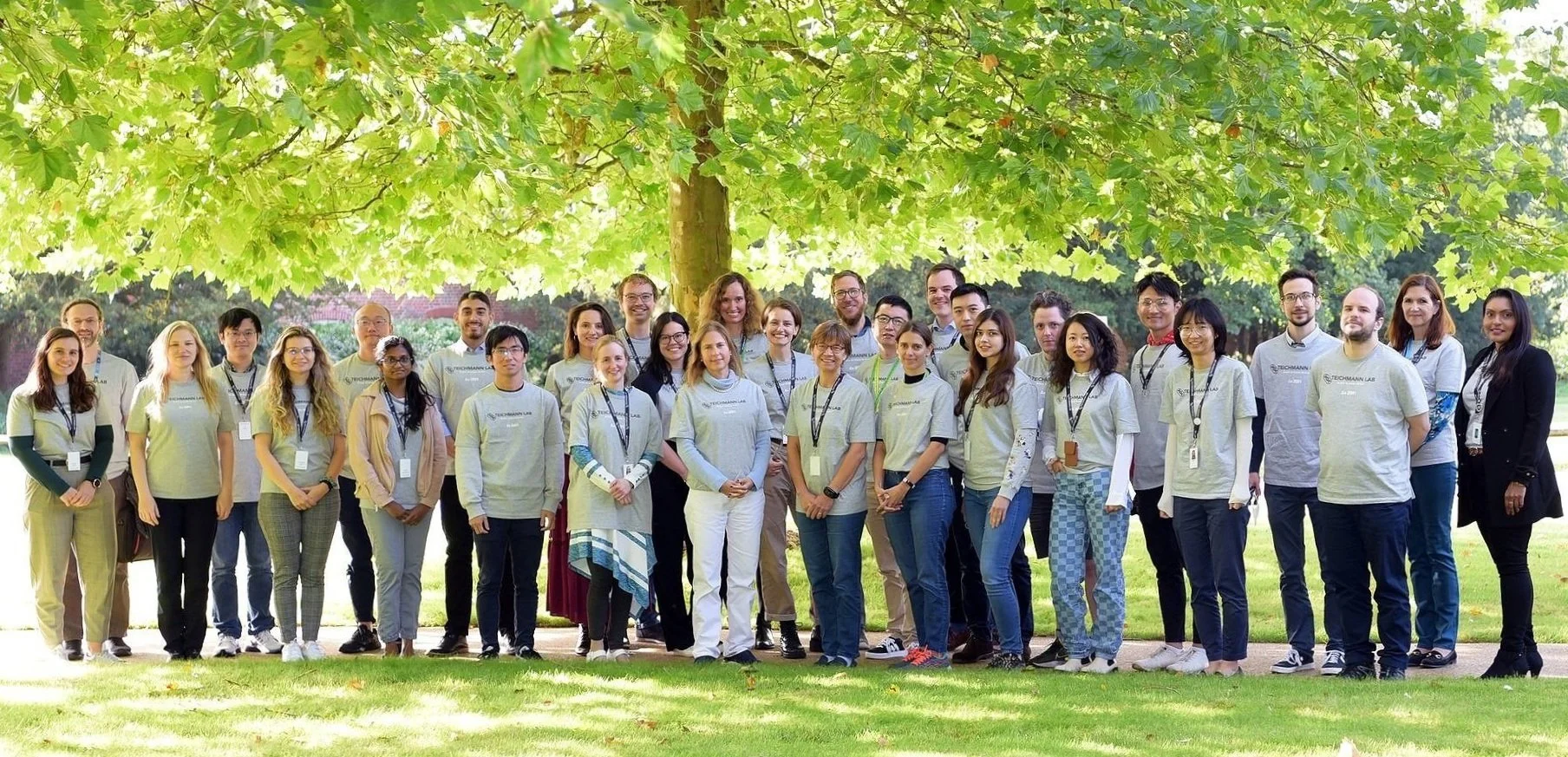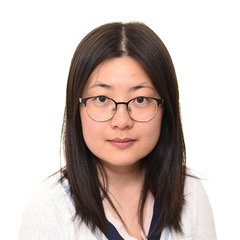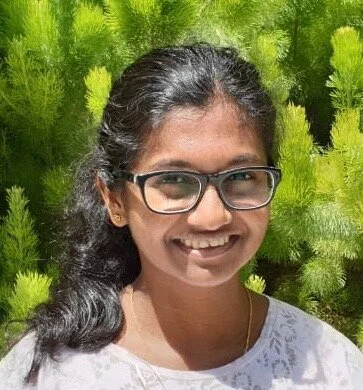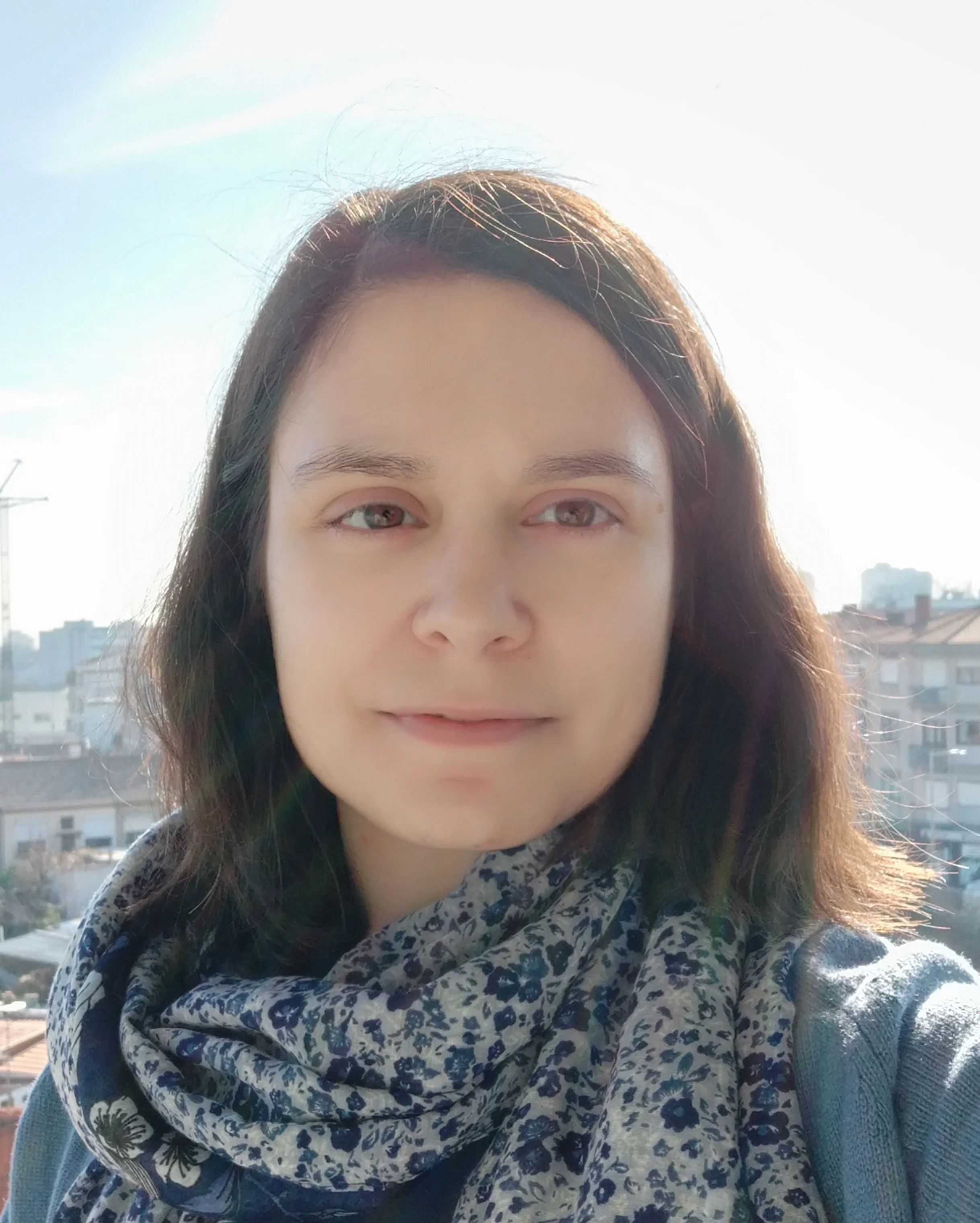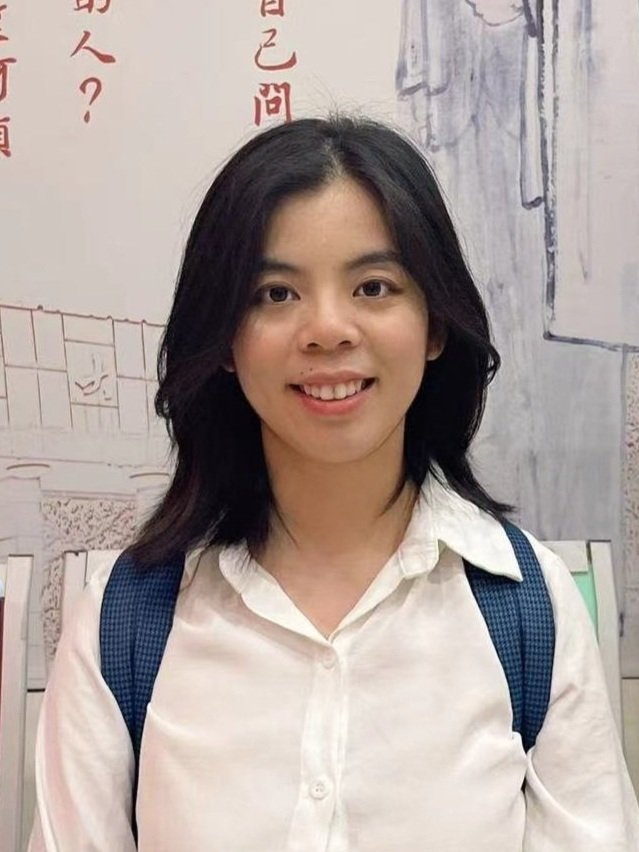A diverse team of scientists from across the world
Group leader
Sarah Teichmann FMedSci FRS (Group Leader)
Sarah Teichmann is interested in global principles of protein interactions and gene expression . In particular, her research now focuses on genomics and immunity. Sarah did her PhD at the MRC Laboratory of Molecular Biology, Cambridge, UK and was a Beit Memorial Fellow at University College London. She started a group at the MRC Laboratory of Molecular Biology in 2001. In 2013, she moved to the Wellcome Trust Genome Campus in Hinxton/Cambridge, where her group was joint between the EMBL-European Bioinformatics Institute and the WT Sanger Institute. In 2016 Sarah was appointed Head of Cellular Genetics at the WT Sanger Institute. In 2024, Sarah took up a Chair in Stem Cell Medicine at the University of Cambridge (Cambridge Stem Cell Institute & Dept Medicine).
Sarah is an EMBO member and a Fellow of the Academy of Medical Sciences and Royal Society, as well as a Fellow of the International Society of Computational Biology. Her work has been recognized by a number of prizes, including the Lister Prize, Biochemical Society Colworth Medal, Royal Society Crick Lecture and EMBO Gold Medal.
In the press:
Interview with Science Magazine
Interview on Bioinformatics Blog ACGT.me
Interview with Cell Press CrossTalk
Sarah's Profile on Nature Methods
Sarah’s Life & Work in Book “Ahead of the Curve” (Amazon)
Exploring the single cell universe with Dr. Sarah Teichmann
Night Science: Sarah Teichmann’s artist colony of scientists
Staff
Anna Wilbrey-Clark (Staff Scientist)
Anna Wilbrey-Clark is a Staff Scientist working on the Human Cell Atlas project. She is a ‘wet-lab’ scientist interested in using single cell sequencing and spatial / imaging techniques to understand the cell type composition of human organs. Anna joined the lab in 2017, having previously completed a PhD in Molecular Biology / Neuroscience at the Babraham Institute and worked for 7 years in the pharmaceutical industry.
Krzysztof Polański (Staff Scientist)
Krzysztof Polański is a computational Staff Scientist working on the Human Cell Atlas project. He specialises in single cell and spatial data analysis, with particular interests including batch correction and clustering algorithms. Krzysztof got a PhD in Systems Biology from the University of Warwick in 2015, with his thesis focusing on regulatory events in Arabidopsis response to stress, and has joined the lab in 2017.
Alicja Wilk (Laboratory Manager)
Alicja joined the team in April 2021. She manages the wet laboratory part of the group. She previously worked in Cardiovascular Genetics research section focusing on Next Generation Sequencing and in Haemato-oncology diagnostic services.
Shani Perera
Shani Perera is an Advanced Research Assistant working on the Human Cell Atlas project with a primary role in performing histology, spatial transcriptomics and imaging using cutting-edge technologies.
Rakesh Kapuge
Rakesh is an Advanced Research Assistant working in our wetlab support team since January 2022. He joined the team from the Microbiology/Molecular clinical diagnostic laboratory in Addenbrookes Hospital. His work includes tissue processing and sequencing library preparation in the wetlab team.
Shuang Li
Shuang joined Teichmann lab in June 2022 as a senior bioinformatician to study age-dependent immunity changes as well as its genetic component.
After completing a bachelor degree in biosystems engineering in Zhejiang university, Shuang did a master program in Wageningen University and went on for a PhD in the functional genomics group in the University Medical Center Groningen. During her PhD, she worked on developing computational methods and tools for variant interpretation for rare and complex diseases.
Simon Koplev
Simon completed his BSc in Biochemistry at the University of Copenhagen and MScEng in Systems Biology at the Technical University of Denmark. He obtained his PhD in Medical Science from the University of Cambridge on multiplex imaging of pancreatic cancer. He has previously worked as a research scholar at Harvard Medical School; a research assistant at the University of Copenhagen; and a bioinformatician at the Icahn School of Medicine on the genetics of cardiovascular diseases. In 2023, Simon joined the Teichmann lab as senior bioinformatician with a strong interest in cross-organ analysis for the Human Cell Atlas spanning the heart, thymus, and gut, while focussing on the diverse roles of fibroblasts and tissue-resident immune cells in maintaining healthy tissue structure.
Duy Pham
Duy completed a BSc at the University of Science and Technology of Hanoi, Vietnam. After graduation, he worked as a Data Scientist in industry for four years. In 2023, he earned a PhD from the University of Queensland, Australia. His thesis focused on developing computational methods to integrate single-cell and spatial transcriptomics with imaging data to understand the spatio-temporal dynamics of neurotrauma and cancer progression. He joined the Teichmann lab in 2023 as a Senior Computational Biologist, where he uses multi-omics data to characterise the spatial structure of the lung at the cellular level as part of the Human Lung Cell Atlas project.
Postdocs
Kazumasa Kanemaru
Kazumasa completed his medical degree in 2012 and PhD in 2016 at the University of Tsukuba, Japan. During his PhD and postdoc in Dr. Akira Shibuya’s Lab, he focused on the functional analysis of C-type lectin receptors using mouse disease models, cellular assays, and other wet lab techniques. Kazumasa joined the Teichmann lab in October 2020 and is interested in the analysis of human’s biology and pathology using wet and computational technologies.
He currently holds an overseas research fellowship from the Takeda Science Foundation (Japan).
Chuan Xu
Chuan obtained his B.S. in Biology and Management in the University of Science and Technology of China in 2013. After that, he received his Ph.D. in Computational Biology in CAS-MPG Partner Institute for Computational Biology in 2018, and then started his postdoc in Yale School of Medicine, researching into how evolution and development shape the molecular organisation of brains. Chuan joined the Teichmann lab in November 2020, and is interested in elucidating the genetic principles behind complex tissue organisation and corresponding functionalities.
Dinithi Sumanaweera
Dinithi completed her BSc (Honours) and MSc (Research) degree at University of Moratuwa, Sri Lanka, for which she studied Computer Science & Engineering and Bioinformatics, respectively. She then joined Dr. Arun Konagurthu's lab at Monash University, Australia, to work on protein alignment modelling using Information theory and Bayesian inference, and received her PhD in Computational Biology in 2021. Dinithi will be joining the Teichmann lab in June 2021 as a Marie Curie postdoctoral fellow and will focus on computational models for comparing in vitro and in vivo single-cell transcriptomic profiles.
Ana-Maria Cujba
Ana-Maria completed her integrated BSc and MSc degree in Biochemistry (Immunology) with a year placement at GSK in Aberdeen, Scotland. She is completing her PhD work focused on monogenic diabetes using stem cells, genome engineering and organoids at the Centre for Stem Cells and Regenerative Medicine at King’s College London, UK. She is interested in both wet lab and bioinformatics approaches for investigating cell fates and composition in healthy and diseased states using relevant in-vitro human model systems. Ana-Maria will be joining Teichmann lab from July 2021 and will be working as part of the Human Cell Atlas.
Amanda Oliver
Amanda studied Biochemistry and Molecular Biology at the University of Queensland before completing her PhD in Immunology at the Peter MacCallum Cancer Centre and the University of Melbourne. For her PhD, Amanda uncovered a mechanism for cancer immunotherapy resistance through tissue-specific immunity in lung metastases. Amanda joined the team in January 2021 and is interested in defining the complex immune environment in healthy lungs and understanding the mechanisms of dysregulated immune responses in disease, such as asthma.
Ana Raquel Maceiras
Ana Raquel has a BSc in Biochemistry from University of Porto, and a MSc in Molecular Genetics from University of Minho that included a one-year placement at the Department of Molecular Biology of Umeå University. She then moved to IMM, in Lisbon, where she completed her PhD studies focused on Tfr cells. Afterwards, she went back to Porto where she did a postdoc, at i3S, on the immune response to Mycobacterium tuberculosis infection. In 2020 she started a MSc in Bioinformatics and Computational Biology at the University of Porto since she is interested in applying single cell RNA sequencing and bioinformatics to better understand the immune system.
Ana Raquel joined the Teichmann lab as a postdoctoral fellow in 2022 to study the immune system aging.
Lijiang Fei
Lijiang is interested in systematically understanding molecular mechanisms that underlies cell fate decisions based on cell atlases using computational tools. She obtained her Bachelor’s degree in Ocean University of China in 2017. And she received her PhD degree in Stem Cell and Regeneration Medicine in Zhejiang University. Lijiang joined the Teichmann lab in August 2022 and will work on the Human Cell Atlas project.
Stathis Megas
Stathis studied Physics at the University of Athens and CERN where he created and analysed simulations of supersymmetric field theories. He then completed his MSc and PhD at UCLA on physical mathematics and theoretical physics, focusing on defining rigorous and exactly solvable models of 2d topological quantum gravity equipped with any open/closed Atiyah TQFT and using them to derive insights about the black hole information paradox. Stathis joined the Teichmann lab in March 2023 as a postdoc, working closely with the Lotfollahi lab. He is interested in the mathematical design of deep learning algorithms for disentangled representations and causal inference in single-cell and spatial genomics, with an aim at understanding gene regulation and protein-ligand interactions.
Lorenz Kretschmer
Lorenz studied medicine at the Technical University of Munich (TUM, Germany) and completed specialty training in "Microbiology, Virology and Infection epidemiology". His research focuses on memory T cells and understanding how immunological memory develops in response to infection or vaccination using various single cell technologies. Lorenz served as a board member of the "Young Immunologists" in the German society for immunology (DGfI), where he has been representing and supporting early career researchers.
He joined the Teichmann laboratory in May 2023 as a postdoc in the Accelerate Programme at the University of Cambridge and has recently transitioned to the Wellcome Sanger Institute with fellowship support from EMBO and the Royal Society.
Ioannis Sarropoulos
Ioannis studied Biology at the Aristotle University of Thessaloniki in Greece and then moved to Heidelberg, Germany for a MSc in Molecular Biosciences. He stayed in Heidelberg for his PhD, during which he explored the contributions of non-coding elements, such as lncRNAs and cis-regulatory elements, to the development and evolution of mammalian organs.
Ioannis joined the Teichmann lab as an EMBO postdoctoral fellow in July 2023 and aims to use single-cell genomics to study gene regulation in the human thymus.
Olli Dufva
Olli completed his medical degree in 2020 and PhD in 2022 at the University of Helsinki, Finland, where he studied immune interactions and precision medicine in blood cancers using functional genomics.
Olli joined in September 2023 as a postdoctoral fellow jointly in the Teichmann and Garnett labs. His research focuses on deciphering genomic determinants of anti-cancer immunity using organoid models, single-cell genomics and genetic engineering
Veronika Kedlian
Veronika has a long-standing interest in using the power of computational approaches and single-cell RNA-sequencing to understand the mechanism of ageing changes.
Before joining the group, Veronika studied expression variability in the human brain with age as a trainee in Janet Thornton group at European Bioinformatics Institute, UK and looked into the cellular mechanisms of the Hutchinson-Gilford Progeria - rare accelerated ageing disease - as an intern in Oliver Dreesen group, IMB, Singapore. Veronika has completed M.Sc. and B.Sc. training in Molecular Biology and Genetics at Taras Shevchenko National University of Kyiv, Ukraine. Veronika is jointly supervised by Sarah Teichmann and Inigo Martincorena.
Clinical Lecturers
Chenqu Suo
Chenqu joined the Teichmann group in 2019 as a Wellcome Trust funded clinical PhD student. After finishing her PhD, she was elected as an NIHR Clinical Lecturer at the University of Cambridge. Her area of research has been primarily focused on human immune cell development from both in vivo and in vitro angles, utilising a combination of experimental tools such as artificial thymic organoids and newly developed computational approaches on scVDJ-seq data and trajectory alignment.
Before joining the lab, Chenqu completed her medical degree and undertook an NIHR Academic Clinical Fellowship in the University of Cambridge. She is a paediatrician in training, with a clinical interest in Paediatric Rheumatology.
James Cranley
James is a NIHR Clinical Lecturer in Cardiology at the University of Cambridge. His clinical areas of interest are electrophysiology and inherited forms of cardiac disease. His PhD (2021-2024) was supervised by Professor Teichmann and centred on the molecular and spatial profiling of the heart's conduction system. He received his medical degree from Oxford University before undertaking a NIHR Academic Clinical Fellowship based in Cambridge.
PhD Students
Ken To
Ken is an MRC funded clinical PhD student. He is interested in the development of the peripheral nervous system, and how this relates to the development of musculoskeletal pain in adulthood. He completed his medical degree at the University of Cambridge and was a junior doctor based in Cambridge prior to joining the lab.
Lisa Dratva
Lisa obtained her BSc and MSc degree from the Ecole Polytechnique Federale de Lausanne (EPFL) in Switzerland before joining the Teichmann lab in March 2022 for her PhD. She completed her Master thesis as a Visiting Graduate Student at Harvard University in the Church lab, where she built a deep learning model to predict gene expression. Lisa also went through multiple experiences in industry, both with big pharma and small start-ups.
As an Early Stage Researcher supported by the ENLIGHT-TEN+ training network, her research will focus on the human T cell response using computational analysis and leveraging single cell multi-omic atlas data.
Madelyn Moy
Madelyn is a Wellcome Trust Sanger Institute PhD student who joined the Teichmann lab in 2022. She received her B.A. from Northwestern University, where she majored in Anthropology, Biological Sciences, and Integrated Science. For her PhD project, she will use computational approaches and in-vitro human model systems to study host-microbe interactions during early-life intestinal development.
Jack Palmer
Jack is a PhD student on the British Heart Foundation 4-Year PhD Studentship Programme in Cardiovascular Research, who joined the Teichmann lab in 2023. He is jointly supervised by Sarah Teichmann and Richard Tyser (CSCI). He is working on understanding and improving in vitro models of cardiac cells using insights from adult and developing human heart atlases.
He previously completed an integrated master’s degree in Biochemistry at the University of Oxford, where he wrote his master’s dissertation on transposable elements in X-chromosome inactivation at the Department of Biochemistry (Brockdorff Lab).
Daniel Chen
Daniel has been a Master's student under Sarah Teichmann since Autumn 2023. He is interested in the development and application of integrative systems biology methods, particularly those involving spatial technologies, to investigate cell-cell communication and shifts in immune cell behavior during human health challenges. He is especially interested in the adaptive arm of the immune system, with high interest in T cells, and has previously worked on these efforts at the Institute of Systems Biology and the Fred Hutchinson Cancer Center

